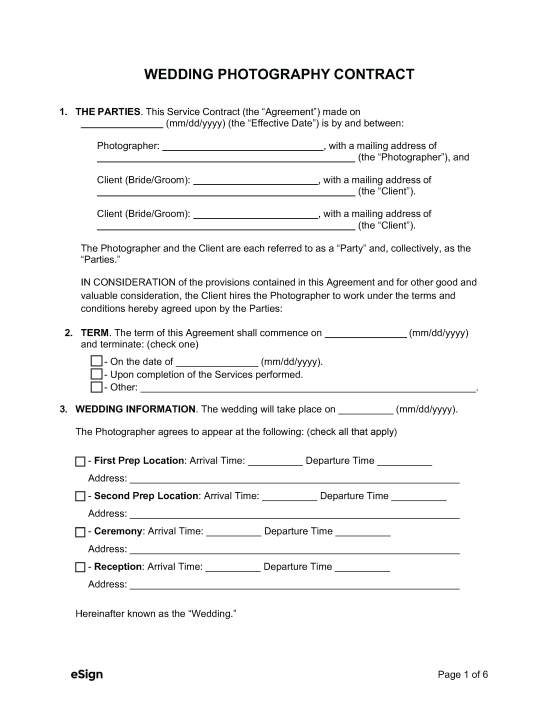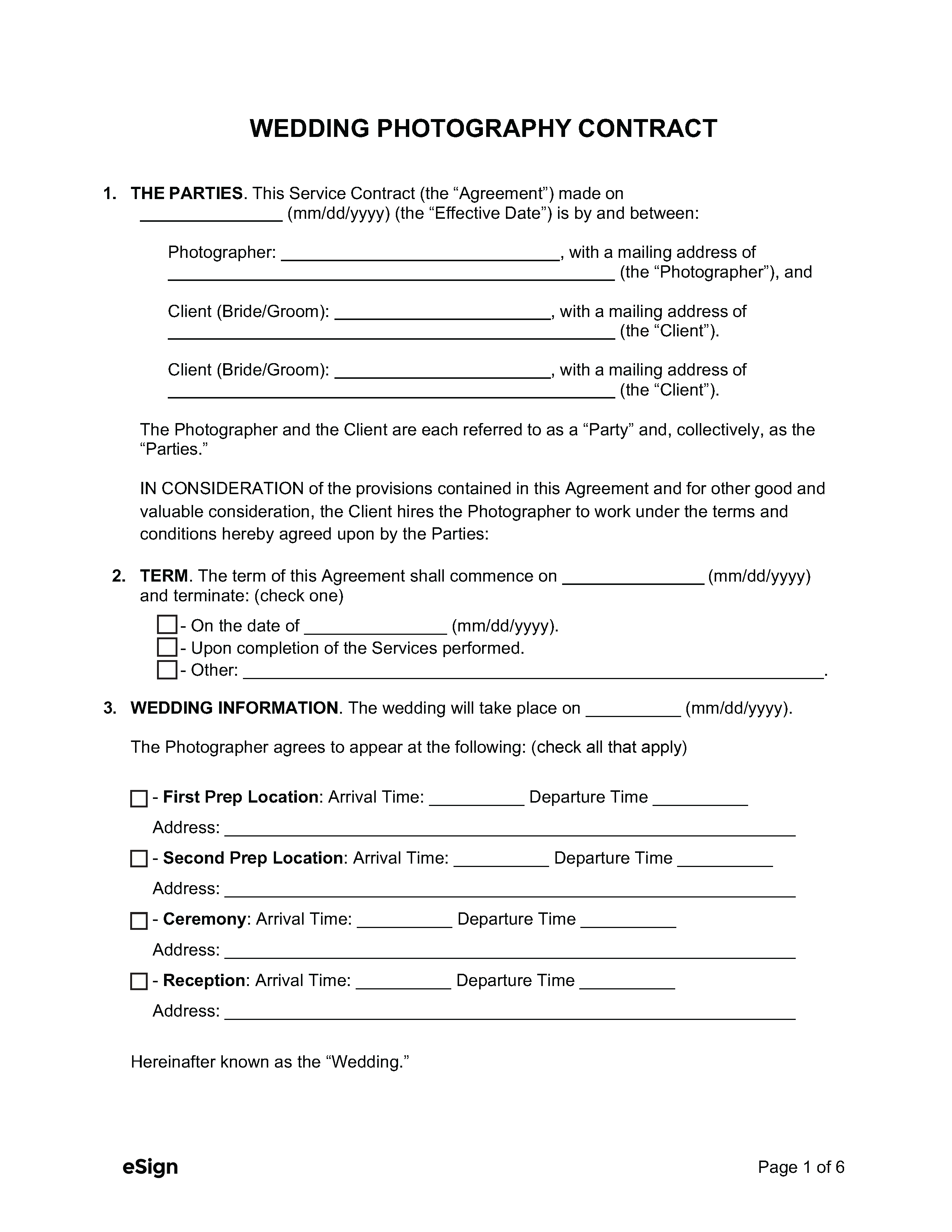What To Include
Contact Information – The name and contact information of the couple and the photographer should be included in the agreement.
Locations and Schedule – Each location (generally two for weddings) and the wedding schedule should be noted. The contract should detail:
- Where the bride and groom will get ready
- The ceremony and reception venue
- The location of specific photos, including family photos, couples only photos, bridesmaid and groomsmen photos
Payment – It is important to note how much the photographer will be paid, including deadlines, payment methods, and deposits.. The contract should also state how long the photographer will be capturing the event, and at what rate overtime will be charged.
Cancellations – As weddings are often booked months or years in advance, it is crucial to have a policy addressing any issues that may interfere with the wedding. The photographer’s cancellation, rescheduling, and refund policy should be stated in the contract.
Copyright Details – Most photographers will have a copyright clause in their contract stating that the photographer retains the right to all photos. The couple can use their images for personal use, but not for commercial purposes unless authorized.
Model Release – It is common practice to include a model release in the agreement. This states that the couple consents to the photographer using their images for their own advertising, marketing, and promotional use.
Other Considerations
Every wedding is different, and every photographer has their preferences regarding how they want to manage their business. Some common considerations for a photography contract include:
- Whether to include RAW photos (most photographers don’t).
- Guidelines regarding guest behavior and harassment.
- If location permits are required, a clause stating who will be responsible for acquiring them.
- Turnaround time, number of photos to be edited, and editing style.
- A clause stating that, due to the nature of event photography, the photographer will not be held responsible for missed images due to circumstances beyond their control.
Common Lawsuits
A well-drafted contract is important to protect both photographers and their clients. Occasionally, an unhappy couple may attempt to sue their wedding photographer. Three common types of lawsuits brought against wedding photographers are:
- Breach of Contract. This lawsuit is brought about when the couple believes that the wedding photographer failed to provide the services they promised. Usually, this occurs when the photographer fails to capture the event, loses photos, or does not show up.
- Misappropriation. When the photographer uses an image without being given the appropriate authorization from the photographed party.
- Misrepresentation. This occurs when a photographer is accused of committing or misstating a contract term so that the client will sign the agreement.
Sample
WEDDING PHOTOGRAPHY CONTRACT
1. THE PARTIES. This Service Contract (the “Agreement”) made on
[MM/DD/YYYY] (the “Effective Date”) is by and between:
Photographer: [PHOTOGRAPHER NAME], with a mailing address of [PHOTOGRAPHER ADDRESS] (the “Photographer”), and
Client (Bride/Groom): [CLIENT NAME], with a mailing address of [CLIENT ADDRESS] (the “Client”).
Client (Bride/Groom): [CLIENT NAME], with a mailing address of [CLIENT ADDRESS] (the “Client”).
The Photographer and the Client are each referred to as a “Party” and, collectively, as the “Parties.”
2. TERM. The term of this Agreement shall commence on [MM/DD/YYYY] and terminate:
☐ – On the date of [MM/DD/YYYY].
☐ – Upon completion of the Services performed.
☐ – Other: [OTHER TERM].
3. WEDDING INFORMATION. The wedding will take place on [MM/DD/YYYY]. The Photographer agrees to appear at the following:
☐ – Prep Location: Arrival: [HH:MM] Departure [HH:MM] Address: [PREP ADDRESS]
☐ – Ceremony: Arrival: [HH:MM] Departure [HH:MM] Address: [CEREMONY ADDRESS]
☐ – Reception: Arrival: [HH:MM] Departure [HH:MM] Address: [RECEPTION ADDRESS]
Hereinafter known as the “Wedding.”
4. SERVICES. The Photographer agrees to provide the following: [DESCRIBE SERVICES].
Hereinafter known as the “Services.”
The Photographer guarantees that they shall perform the Services in compliance with the policies, standards, and regulations of the Client, including local, state, and federal laws, and to the best of their abilities.
5. PAYMENT AMOUNT. The Client agrees to pay the Photographer the following compensation for the Services performed under this Agreement: (check all that apply)
☐ – Per Hour. $[RATE]/ hour. Overtime will be charged at a rate of $[RATE]/hour.
☐ – Per Job. $[RATE] for the completion of the Services.
☐ – Other: [OTHER AMOUNT].
Hereinafter known as the “Compensation.”
6. PAYMENT METHOD. The Client shall pay the Compensation: (check one)
☐ – Upon completion of the Services performed.
☐ – Upon the Client receiving an invoice from the Photographer.
☐ – Other: [OTHER METHOD].
7. RETAINER. The Client is: (check one)
☐ – REQUIRED to pay a Retainer in the amount of $[RETAINER AMOUNT] to the
Photographer as an advance on future Services to be provided (the “Retainer”). The Retainer is non-refundable.
☐ – NOT REQUIRED to pay a Retainer before the Photographer is able to provide
Services.
8. CLIENT CANCELLATION. The Client may cancel this Agreement up to [#] days prior to the Wedding. To do so, the Client must send a written cancellation notice via email or certified mail. By doing so, the Client will forfeit any Retainer given. Client agrees to pay the full amount for the Services should they cancel the Agreement within [#] days of the wedding.
9. ENTIRE AGREEMENT. This Agreement constitutes the entire agreement between the Parties to its subject matter and supersedes all prior agreements, representations, and understandings of the Parties. No supplement, modification, or amendment of this Agreement shall be binding unless executed in writing by the Parties.
IN WITNESS WHEREOF, the Parties have signed and duly executed this Agreement on the dates identified below.
Client’s Signature: _________________________ Date: [MM/DD/YYYY]
Print Name [CLIENT PRINTED NAME]
Photographer’s Signature: _________________________ Date: [MM/DD/YYYY]
Print Name [PHOTOGRAPHER PRINTED NAME]

